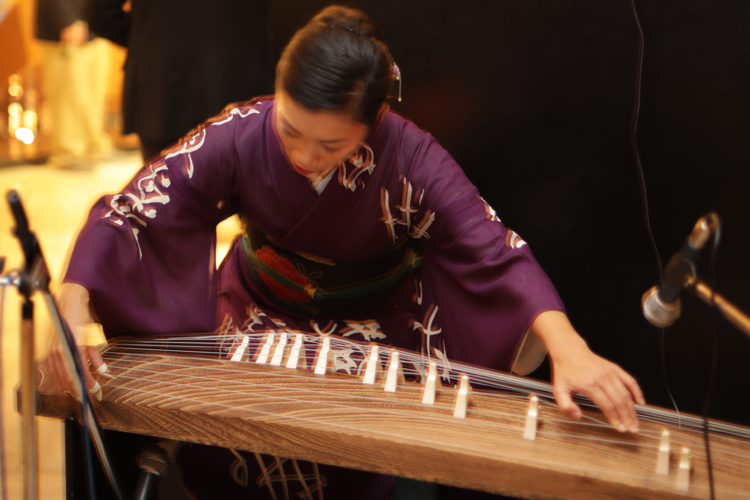GOAL 2019 in India Draws 475 Attendees, Makes Headlines
Another edition of the Global Aquaculture Alliance’s GOAL (Global Outlook for Aquaculture Leadership) conference is in the books! GOAL 2019, held at the Leela Palace in Chennai, India, from Oct. 21 to 24, drew 475 attendees, up more than 25 percent from GOAL 2018 in Guayaquil, Ecuador. This year’s conference, the 20th installment of GOAL and the 10th time that GOAL has been held in Asia, featured 60 speakers from 16 countries.
Here are seven newsworthy events that occurred during GOAL 2019:
1. Conference theme emphasizes need for industry to ‘commit’
The theme of GOAL 2019 — Connect. Collaborate. Commit. — reverberated throughout the conference, beginning with GAA CEO Andrew Mallison’s challenge to attendees on Tuesday, which he circled back to at the close of the conference on Thursday. “We need to display commitment. I put out that challenge on Tuesday morning when I said, ‘Who’s going to set up and give a commitment,’” said Mallison. “That was a big ask.”
Multiple corporations stepped up with a commitment, including Sam’s Club, Walmart, Ahold Delhaize, US Foods, Disney, Grobest, Pescanova, Zhanjiang Guolian Aquatic Products Co. Ltd., Lineage Logistics/Preferred Freezer Services and Hendrix Genetics. In his talk on Thursday, Mallison singled out Sam’s Club, which committed to launch a pilot of a blockchain-based traceability system that, if successful, will apply to its wild and farmed seafood supply chain; work with the Best Aquaculture Practices (BAP) certification program on enhanced social audits in its farmed shrimp supply chain; and work with Global Seafood Assurance’s Responsible Fishing Vessel Scheme and Seafood Processing Standards for its wild seafood supply chain.
2. Galiher, Brahmanandam honored with Lifetime Achievement Awards
GAA awarded two Lifetime Achievement Awards at GOAL 2019. Last year, the award was renamed the Wallace R. Stevens Lifetime Achievement Award in honor of Wally Stevens, GAA’s former executive director. This year, John Galiher, founder and CEO of Preferred Freezer Services, and Brahmanandam Potru, founder and CEO of Devi Seafoods Ltd., were honored for their integrity, leadership and commitment to responsible aquaculture.
Galiher founded Preferred Freezer Services in 1989 at the age of 27. His unique experience in engineering, construction, sales and management drove the company’s growth and corporate identity. Preferred was listed as one of the top 5,000 fastest growing private companies in the United States almost every year from 2007 to 2017. And, in just 30 years, Preferred designed and built a network of 44 cold-storage facilities throughout the United States and Asia. Preferred was the world’s third largest cold-storage company when it was acquired by Lineage Logistics, the world’s No. 1 cold-storage company, in February.
“Collaboration is the way forward,” said Galiher after accepting his Lifetime Achievement Award from GAA President George Chamberlain on Tuesday. “You look at me and say, ‘Here’s this guy in the warehousing and logistics business getting an award for aquaculture. But it’s because I believe in [sustainable aquaculture]. For us to be successful, we need to collaborate. We all need to work together.”
Brahmanandam, also known as “Mr. P.B.,” accepted his Lifetime Achievement Award from GAA VP Bill Herzig on Wednesday. He established Devi Seafoods in 1992 and quickly grew the company into one of India’s largest shrimp exporters; the company’s annual sales now exceeds USD $150 million. Darden Restaurants was Devi Seafoods’ first major U.S. customer. Its customers now include Sysco, US Foods and the Cheesecake Factory. Sysco has honored Devi Seafoods as its seafood supplier of the year four times, as recently as 2018.
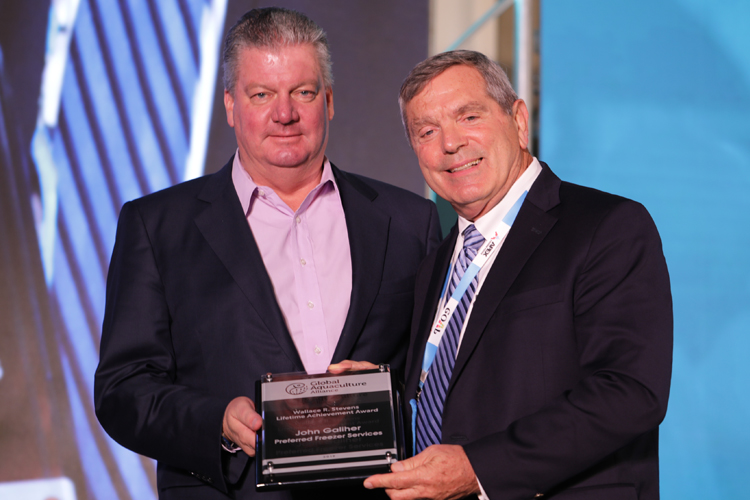
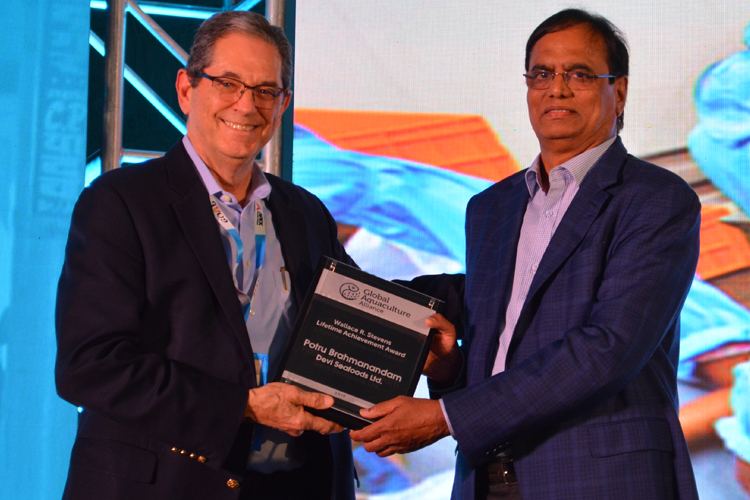
3. In-water electric stunning device wins Global Aquaculture Innovation Award
For the second consecutive year, the winner of the seventh annual Global Aquaculture Innovation Award, sponsored by Preferred Freezer Services, was selected by the GOAL audience. The three finalists were Mike Forbes of Ace Aquatec, Emily Glenn of Arbiom and Adriano Mallmann of Pegasus Science. Each gave a 10-minute pitch to win over the audience on Wednesday. With 51 percent of the audience vote, Forbes was dubbed the winner for his Scottish company’s in-water electric stunning device, which promises a more humane slaughter for fish.
“The stunning process can be a huge stress to fish. Thanks to our in-water electric stunning device, it absolutely does not need to be anymore,” said Forbes.
Ace Aquatec’s innovation beat out Arbiom of the United States, which converts dried plant matter into a nutrient-rich protein meal called SylPro that can be used as an aquafeed ingredient, and Brazil’s Pegasus Science, whose near infrared (NIR) technology improves aquafeed quality by detecting mycotoxins.
GAA established the competition in 2012 to recognize individuals and companies finding new solutions to the key challenges facing aquaculture. This year, a record 43 applications from 20 countries were submitted.

4. Ireland’s Clew Bay is world’s first BAP biosecurity area management certification
The Day 2 plenary on Wednesday opened on a high note, with the surprise announcement that Ireland’s Clew Bay had just been certified against the new BAP biosecurity area management standards, which focus primarily on the prevention and control of pathogenic organisms and the diseases they cause through the implementation of cohesive area-wide management. The standards took five years to develop.
“As soon as the standard was completed, Ireland expressed interest in the certification. It was some five years in the making, and, when it was posted, we immediately received interest from Ireland’s seafood development agency, for an area called Clew Bay,” said GAA Development Director Iain Shone. “We didn’t plan for Clew Bay to certify in time for this GOAL conference. Well, we were wrong. We are absolutely delighted to present the world’s very first BAP biosecurity area management certificate raised by SAI Global to [Clew Bay].”
Accepting the certificate from Shone and Mallison was Donal Maguire of Bord Iascaigh Mhara (BIM), Ireland’s seafood development agency. After the ceremony, he gave a presentation on BIM’s CLAMS (Coordinated Local Aquaculture Management Systems) initiative, a success story in area management.
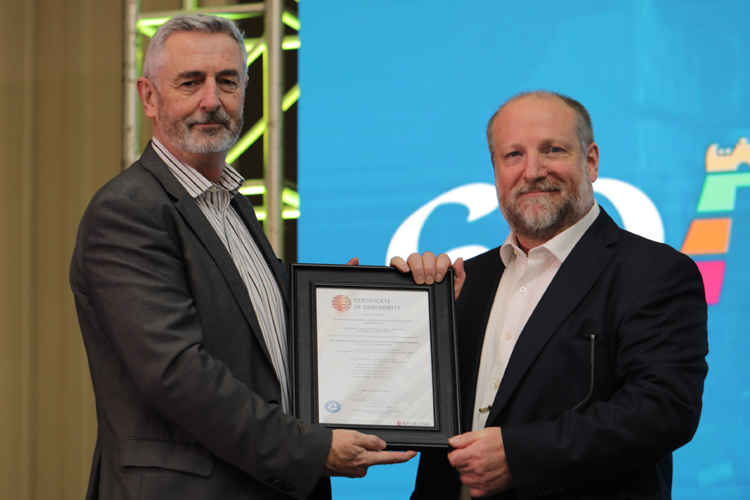
5. Inaugural Farmers’ Day reaches hundreds of farmers, others throughout India, Southeast Asia
For the first time this year, GOAL was broadcast live outside of the conference venue, to give those without the means to attend GOAL the ability to absorb the information presented at the pre-competitive conference. Dubbed “Farmers’ Day” and sponsored by Avanti Feeds Ltd., farm managers and technicians as well as hatchery and processing plant operators were invited to participate in the Day 1 plenary and an India-specific breakout in one of four shrimp hubs throughout India — Balasore, Puducherry, Surat and Vijayawada. Hundreds showed up to listen to presentations on aquaculture production data as well as innovations in shrimp farming, disease management and marketing.
Thanks to the U.S. Soybean Export Council, the Day 1 GOAL plenary was also broadcast live to venues in six cities throughout Southeast Asia — Jakarta, Indonesia; Kuala Lumpur, Malaysia; Yangon, Myanmar; Bangkok, Thailand; Hanoi, Vietnam; and Manila, the Philippines.
6. Experts on food security, antibiotics, social responsibility deliver impactful talks
This year’s conference featured three presenters from outside of the industry. In the Day 1 plenary, Fabrice DeClerck — co-author of the influential EAT-Lancet Commission report “Food. Planet. Health.” — addressed aquaculture’s role in “sustainably intensifying” food production (producing more with less) while balancing the health of humans and the planet. He also talked about aquaculture’s contribution to the United Nation’s Sustainable Development Goals (SDGs).
In the Day 2 plenary, Ramanan Laxminarayan, founder and director of the Center for Disease Dynamics, Economics & Policy (CDDEP) in Washington, D.C., and a senior research scholar at Princeton University, delivered an eye-opening keynote on antibiotics. One of the most respected speakers in his field, Laxminarayan works to improve the understanding of antibiotic resistance as a problem of managing a shared global resource. Through his prolific research, active public outreach (including a widely viewed TED talk) and sustained policy engagement, he has played a central role in bringing the issue of drug resistance to the attention of leaders and policymakers worldwide, including the United Nations General Assembly in 2016.
Finally, in the Day 3 plenary, Rani Hong of Rani’s Voice, a survivor of child trafficking, gave an emotional speech on her personal journey of triumph as well as the progress being made in the fight against modern-day slavery, human trafficking and child labor. Hong is one of the world’s leading voices on the subject as well as a special advisor to the United Nations.
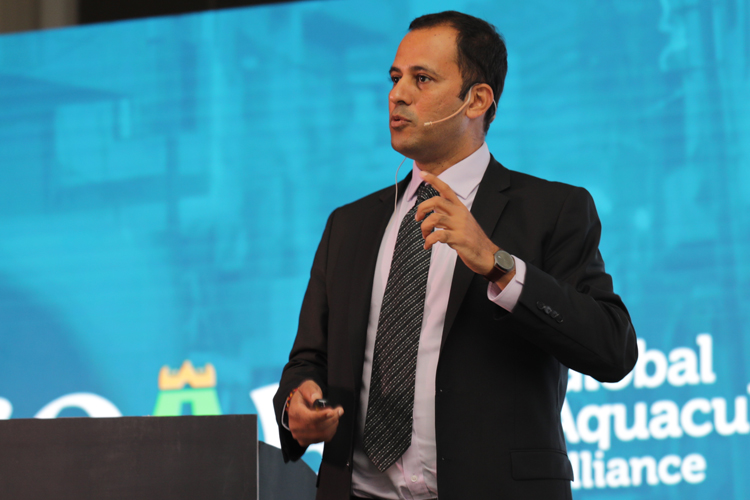

7. Tokyo, Japan, to host GOAL 2020
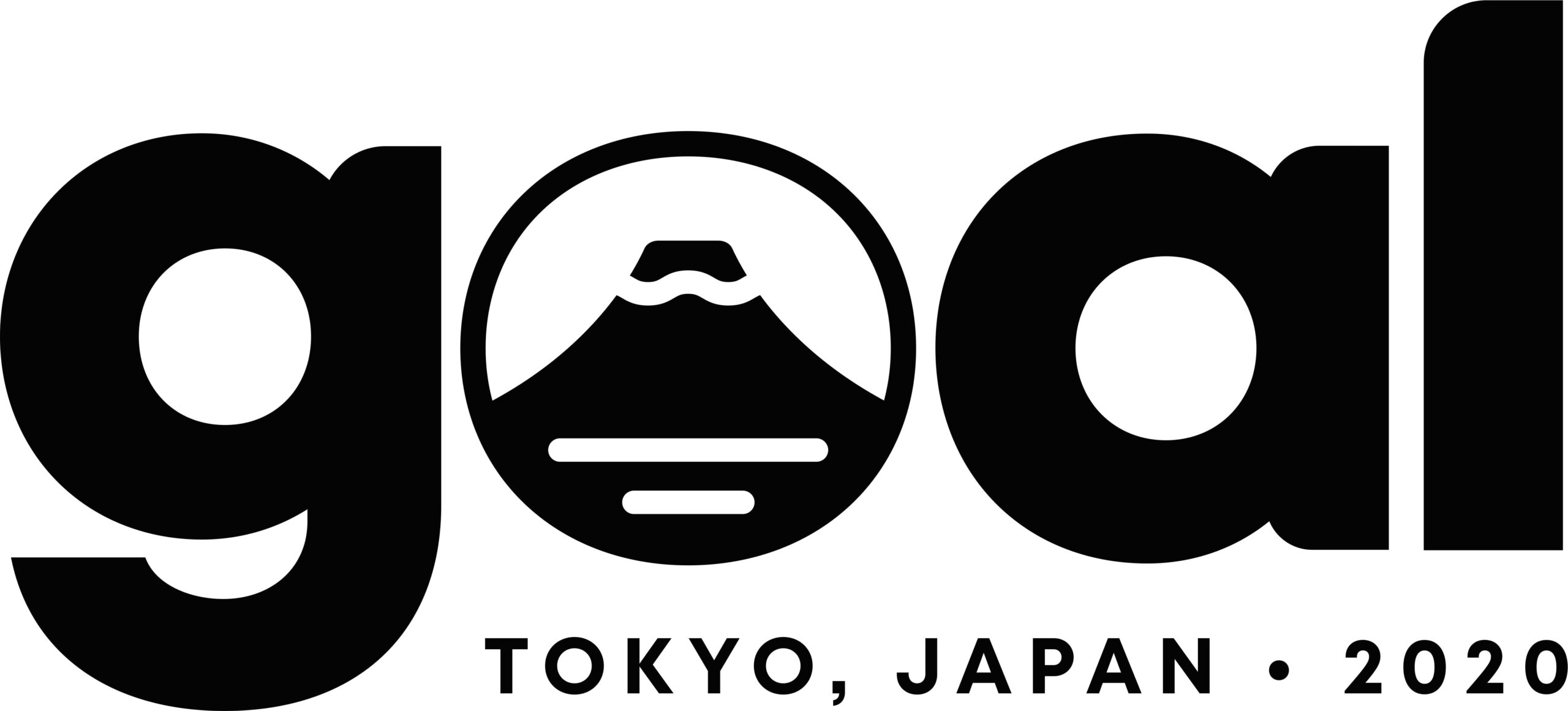 In a special moment at GOAL 2019, Tommy Sekiguchi of Mitsui & Co. Ltd. took to the stage at the end of the Day 2 plenary to unveil the location of GOAL 2020. The ceremony kicked off with an impressive performance by Sumie Kaneko, a professional musician who played the Japanese koto, a 13-string harp. Then, dressed in a Japanese kimono with Tokyo Olympic Games 2020 design, Sekiguchi officially welcomed the GOAL 2019 audience to his home country for GOAL 2020.
In a special moment at GOAL 2019, Tommy Sekiguchi of Mitsui & Co. Ltd. took to the stage at the end of the Day 2 plenary to unveil the location of GOAL 2020. The ceremony kicked off with an impressive performance by Sumie Kaneko, a professional musician who played the Japanese koto, a 13-string harp. Then, dressed in a Japanese kimono with Tokyo Olympic Games 2020 design, Sekiguchi officially welcomed the GOAL 2019 audience to his home country for GOAL 2020.
This is the first time in GOAL’s 19-year history that the conference is being held in Japan. Dates and venue to be announced soon. We hope to see you in Tokyo next year!
